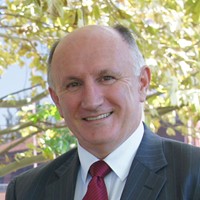For many it will be a challenging time but hopefully, assured by the preparation they have undertaken over the last two years in particular, they will address these challenges with confidence and determination.
We wish them well and we will keep them in our thoughts and prayers in the weeks ahead.
As they engage with their first exam and matriculation experience they may well be unaware of the broader significance of this 2016 Higher School Certificate examination.
This year’s HSC is the 50th Higher School Certificate undertaken in NSW with the first cohort of students to undertake this rigorous assessment of their learning having sat their HSC in 1967. The Higher School Certificate was introduced as part of a suite of changes to secondary education in NSW under the direction of Sir Harold Wyndham, the Director-General of the Department of Education in NSW. The report from the committee he chaired added one more year to Secondary Education and established the School Certificate for Year 10 (or 4th Form) students to replace the old Intermediate Certificate (Year 9 or 3rd Year) in 1965 and the Higher School Certificate two years later for Year 12 students (or 6th Formers), replacing the Leaving Certificate (5th Year or Year 11).
Whilst I wasn’t a candidate for the HSC of 1967, I experienced it two years later and still remember the lead up to it, the essay writing practice, the study break (or StuVac) of one week from the end of formal schooling leading to the first exam paper and the mad cramming over study notes and previous exam papers.
Whilst the 50th HSC is very different in some ways, particularly the number of courses being studied and the number of students completing Year 12 with the HSC, there are still very similar aspects in play today. These include the fact that students, in a computer literate age, are still required to handwrite their essays and responses to questions when most of them could type much quicker than they can write.
It was interesting to note, during the last couple of weeks, calls for the HSC to become an Open Book examination, allowing students to take notes and computers into the exam centres and to access the internet during the exams.
However as for the students of 1967, this 50th cohort will soon be sitting their last paper and be anxiously awaiting their results and the magical ATAR ranking for those seeking to further their studies at university. The big difference to 50 years ago is that the results are available before Christmas, whereas the early days of the HSC saw a much longer waiting period before exam results were communicated to students.
To our HSC class of 2016 we wish them every success in the exams, knowing that through their own efforts and those of their teachers they will have prepared well and will soon realise that the HSC is just a part of their educational journey and that there is definitely life after the HSC.
To the staff of our schools who have guided them along the path to the HSC I extend my sincere thanks for all you have done to make our students’ path as stress free as you possibly could and for providing them with the benefit of your own experience as a student and your years of preparing HSC classes.
My best wishes to all sitting the 50th Higher School Certificate.

